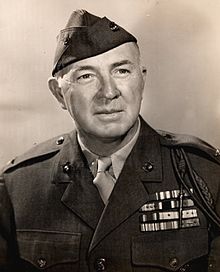Gilder D. Jackson Jr.
| Gilder Davis Jackson Jr. | |
|---|---|

Gilder D. Jackson as colonel, USMC
|
|
| Born |
July 5, 1893 Dover, Delaware |
| Died | February 19, 1966 (aged 72) Coronado, California |
| Buried | Fort Rosecrans National Cemetery |
| Allegiance |
|
| Service/branch |
|
| Years of service | 1917–1946 |
| Rank |
|
| Service number | 0-469 |
| Commands held |
MCB San Diego 6th Marine Regiment The Basic School |
| Battles/wars | |
| Awards |
Navy Cross Legion of Merit Silver Star Purple Heart (2) |
Yangtze Patrol
Haitian Campaign
World War II
Gilder Davis Jackson Jr. (July 5, 1893 - February 19, 1966) was a highly decorated officer of the United States Marine Corps with the rank of brigadier general, who is most noted for his service as commanding officer of the 6th Marine Regiment during the Guadalcanal Campaign.
Gilder D. Jackson Jr. was born on July 5, 1893, in Dover, Delaware. He attended Wenonah Military Academy in Wenonah, New Jersey and graduated in 1912. Jackson later joined the Marine Corps on April 17, 1917 and was commissioned Second lieutenant on the same date. He attended the basic training at Marine Barracks Parris Island, South Carolina and was assigned to the 18th Company, 2nd Battalion, 5th Marine Regiment stationed at Marine Barracks Quantico, Virginia. Jackson was appointed Platoon leader within his company and sailed for France in June 1917.
He commanded his platoon as first lieutenant during the Battle of Belleau Wood in June 1918 and was wounded in the cheek while leading the attack on an enemy machine gun post. Despite his wound, Jackson continued the attack and successfully reached the objective. For his gallanty in action, he was decorated with the Silver Star citation. Jackson recovered quickly, was promoted to the rank of captain and assigned to 43rd Company, 2nd Battalion. He participated with distinction in the Battle of Soissons at the end of July 1918, when he took out an enemy artillery position near the town of Vierzy and captured many prisoners, including two officers. Jackson was subsequently decorated with the Navy Cross for his actions and also received French Croix de guerre 1914–1918 with Palm by the Government of France.
...
Wikipedia
